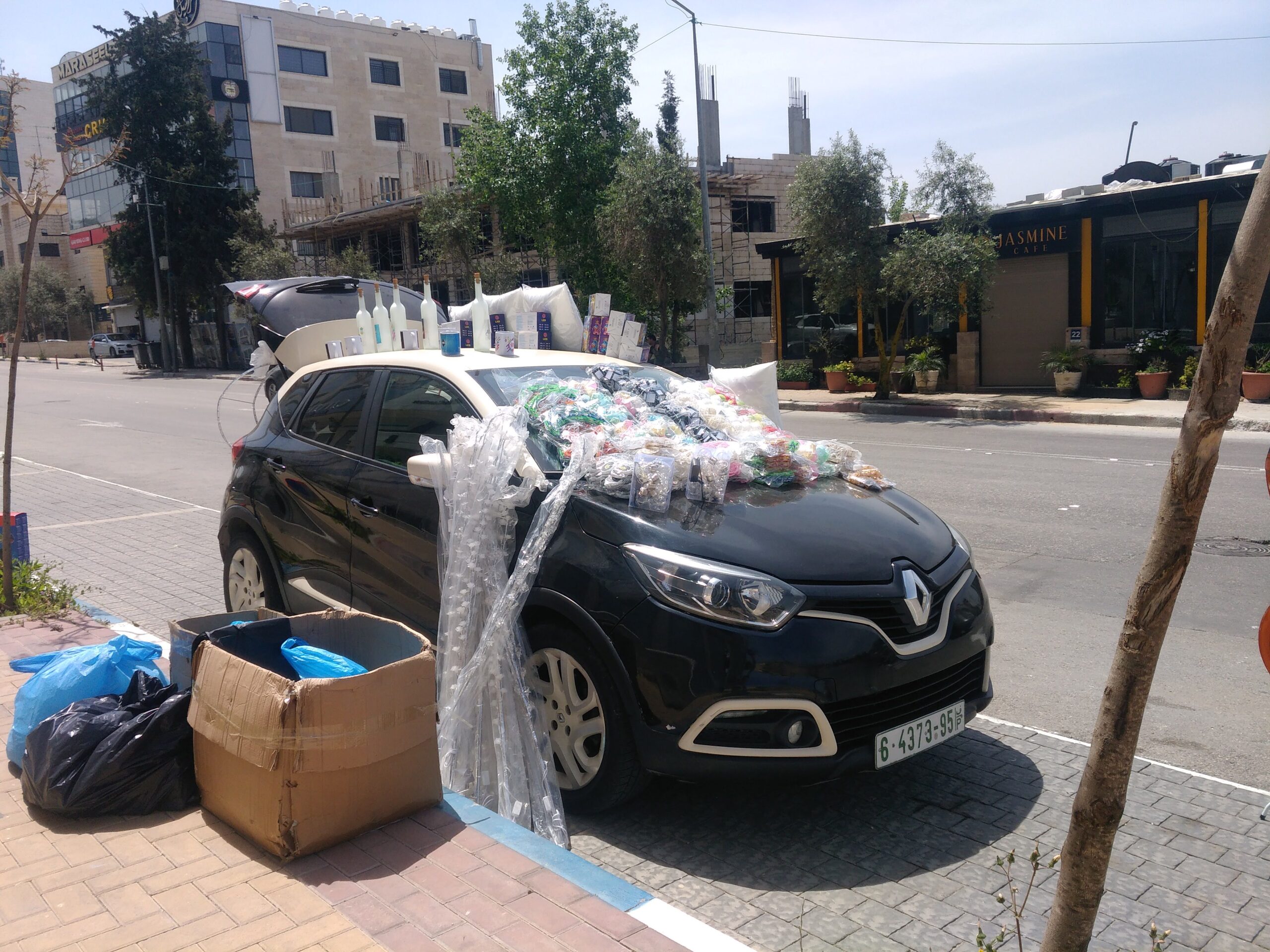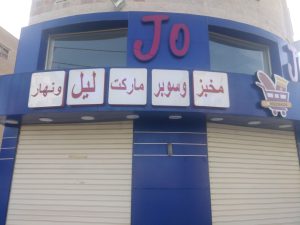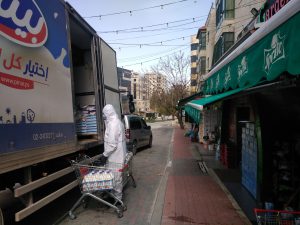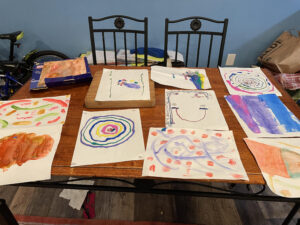Stuck at home, no daycare, my toddler chatters in English, Hebrew and Arabic, while I try to get some work done and keep us safe.
No child care
It’s my turn to work, and the children are knocking on the locked door.
“Ima, I want scissors!”
“There are scissors on the kitchen counter. Ask Baba.”
“OK,” says Forat, aged five.
“Ima, Ima!” Two and a half-year old Adam. “Biddi Nes!” (In Arabic and Hebrew: I want to come in).
“I’m working, sweetheart.”
“Ima, Ima! Lelev!” (In Hebrew: kelev, dog).
“Adam, I’m working.”
The voice of Osama, my partner: “Just look at what I’ll pass to you and say ‘wow’, please.” A piece of paper slides under the door, with a drawing by Osama of Spot the Dog playing with a toy car. Adam had colored the car yellow.
“Wow!” I say. “Spot the Dog is playing with a yellow car!”
“Lelev sek auto yellow,” Adam confirms (in a child’s Hebrew and English, The dog is playing with a yellow car).
For some reason, in the last few weeks, after he stopped going to daycare, Adam’s speech has exploded. He is thrilled about his new skill. He tells us stories about his life and the lives of his stuffed animals, makes small talk about the cat who comes to our door begging for food, and insists that we repeat his words, to make sure we have understood everything correctly. His speech is hard to decipher, because he combines Hebrew, English and Arabic, and usually says just one syllable of each word. “Book,” for example, could be book. Or “hibuk” (hug, in Hebrew). Or “bakbuk” (bottle, in Hebrew). Or “bihibuk” (they love you, in Arabic).
Then it was Osama’s turn to work. I took the children outside to the garden. “Sama!” Adam looked up at our neighbors’ balcony and confidently announced the exciting news: “I’m here!” Sama, two and a half, and her five-year old brother rushed to the balcony, trailed by with their mother, Hiba.
“How are you, Umm Forat?” Hiba asked.
“You know … how about you? Are you working?” Before we all became full-time daycare providers, Hiba worked as a bookkeeper in a pharmaceutical company.
“It’s hard,” she said. “The children … Now I’m supposed to go to the office twice a week, and I have no idea how to manage that.”
“What about Moeen?”
“He’s also supposed to go to work. I’ll try to take the kids to my mother.” They’re a young couple, quiet and pleasant, with three children up to the age of five. Hiba clearly bears most of the burden. Yesterday, Osama heard her yelling at her husband: “I can’t anymore! I’m tired!”
The land is ours, the people are your problem
I’m also starting to get tired. It has been nine weeks without school or daycare. Until now, I had felt a partial common fate with others in the world and also in Israel. But while Israel is starting to open its schools and daycares, with all the controversy that has raised, in the West Bank and Gaza they officially announced that schools would not reopen this academic year. Israel has managed to upgrade the capacity of its health system, which was good to begin with, through governmental investment, fundraising from Jewish communities abroad and acquisition trips throughout the world. That capacity is supposed to give officials room to maneuver in easing the closure. But except for donating a few hundred testing kits and some coordination and training meetings, the Israeli government announced that its Covid-19 efforts would be limited to caring for Israeli citizens and residents, including a half million Israelis living in settlements in the West Bank. A month ago, with the understanding that what happens to Palestinians affects what happens to Israelis, the Israeli Foreign Ministry held a briefing for diplomats in which it encouraged them to donate to a fund established to acquire testing kits, protective equipment and sanitation measures for the five million Palestinians living in the West Bank and Gaza Strip. One of the diplomats asked if Israel would also support the fund. The answer was that “the Palestinians’ needs in this matter are greater than what the State of Israel is able to provide”, and that it was the responsibility of the Palestinian Authority and Hamas “to manage the virus in their territories”.
That answer troubled me. When it comes to annexation plans, the territory belongs to the Jewish people. When non-Jews living there get sick, Palestinians are responsible.
I don’t understand the argument that “It’s not responsibility of the State of Israel! They have a Palestinian government.” For me, that’s like saying that the corona virus outbreak in the Israeli city of B’nei Brak is not the state’s responsibility but rather the responsibility of its mayor. How can we expect the Palestinian Authority to take responsibility for the West Bank, for example, if Palestinian police are banned from entering eighty percent of the territory, and in the rest of the area, police officers have to clear out when the Israeli army decides to arrest people or demolish homes? How can the Israeli authorities control who and what enters and leaves Gaza but abdicate responsibility for the economic situation there, which dictates capacity to deal with the virus? Of course the Palestinian authorities are responsible for Palestinian residents, just as the B’nei Brak city government is responsible for B’nei Brak residents. But for me, if Israel controls the territory, it should also take responsibility for the people living there.
In the absence of adequate health services or control over the territory, and given the low level of public trust, the Palestinian authorities are reluctant to ease the closure. That is despite relative containment of the virus: 354 confirmed cases and two deaths, not including east Jerusalem. On the other hand, the economic and social burden of the closure is growing, making some easing inevitable.
Gradually opening up
I see this state of limbo in the new traffic patterns. It’s still quiet in the morning, but with the start of the Muslim holy month of Ramadan, the traffic jams on Ramallah’s main streets have returned in the afternoons. Stores permitted to open are crowded, and construction sites and some factories have resumed operation. Ramallah municipal workers have begun planting flowers in the traffic circles, and outdoor stands are selling qatayef, the little pancakes, traditional for the holiday, that you fill with walnuts or sweet cheese. Gatherings with people who don’t live in the same house are still forbidden. This is the first Ramadan in which Osama hasn’t cursed the neighbors for holding loud parties into the wee hours of the morning. In the cities, as dusk approaches, police cars patrol to prevent people from traveling to break-fast meals.
But in most areas of the West Bank, the Palestinian police can’t operate, and so the closure there is not enforced. “My family in Beit Fajjar invited me to come, to have a normal Ramadan,” a friend who lives in Ramallah told me. “But I’m afraid, I want to wait.”
It’s hard to know where we are headed. For our family, like many with small children, the corona routine will continue until the end of the summer, when the schools and daycares open. If they open. In the meantime, we’ll take a deep breath and keep drawing pictures of Spot the Dog.
This post was also published at haaretz.com on May 3, 2020:



